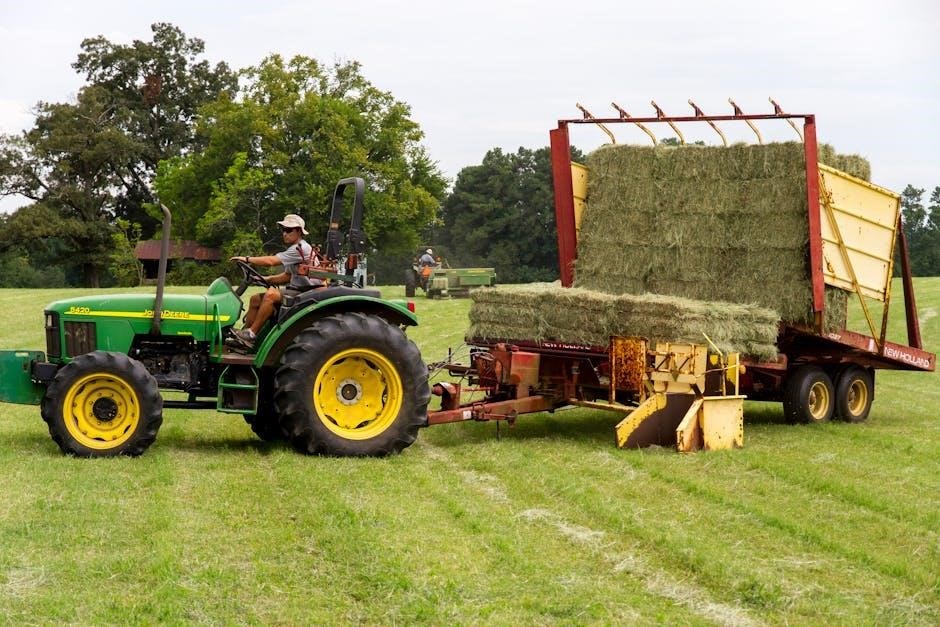This guide provides essential insights into understanding and determining the value of John Deere tractors, covering key factors like model, year, horsepower, and usage․ It helps buyers and sellers make informed decisions by exploring market trends, pricing, and maintenance impact․ Whether you’re purchasing, selling, or maintaining a tractor, this guide offers valuable information to maximize your investment․
1․1 Understanding the Importance of Tractor Valuation
Accurate tractor valuation is crucial for making informed decisions when buying, selling, or maintaining equipment․ It helps determine fair market prices, ensuring transparency in transactions․ Understanding tractor value guides buyers in selecting the right model and sellers in setting competitive prices․ This process also highlights how factors like condition, usage, and technology impact worth, aiding in maximizing investment value and avoiding financial losses․ Proper valuation ensures smarter, more confident dealings in the tractor market․
1․2 Overview of John Deere Tractor Models and Series
John Deere offers a diverse range of tractor models and series, catering to various agricultural and utility needs․ From compact utility tractors like the 5050D to high-horsepower models exceeding 300 HP, the lineup includes options for small farms and large-scale operations․ Series such as the P-TIER and classic models like the 1010 provide durability and advanced features․ Each series is designed for specific tasks, ensuring versatility and efficiency, making John Deere a trusted choice for farmers and professionals worldwide․
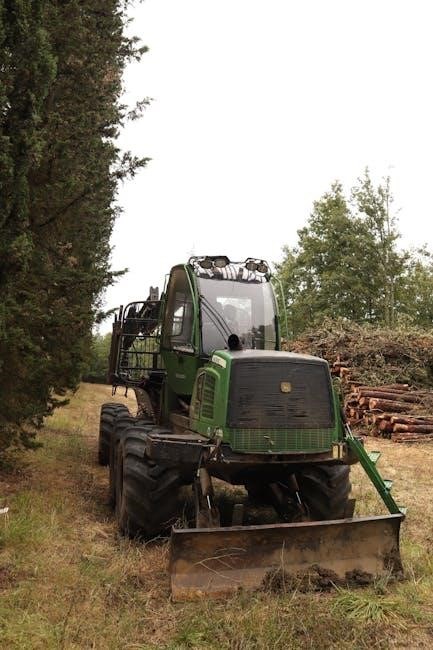
Factors Affecting John Deere Tractor Value
Horsepower, model, year, and usage hours significantly influence tractor value․ Advanced technology and features also play a role, as well as the tractor’s overall condition and maintenance history;
2․1 Horsepower and Engine Power
Horsepower significantly impacts tractor value, with higher hp models like the John Deere 320 P-Tier commanding premium prices․ Engine power and efficiency influence both new and used tractor pricing, as heavier-duty models are in higher demand․ Tractors ranging from 40 hp to over 300 hp cater to diverse needs, affecting their market value․ Advanced engine technology also enhances resale value, making newer models with improved performance more desirable to buyers․
2․2 Model and Year Significance
Specific John Deere models, such as the 5050D, and their production years significantly influence value․ Newer models with advanced technology, like those in 2025, tend to hold higher value due to improved performance and efficiency․ Heritage models, like the 1010, also attract collectors, boosting their worth․ The model’s reputation, features, and year of manufacture are critical factors in determining both new and used tractor prices, impacting resale value and market demand․
2․3 Hours of Operation and Usage
Tractors with lower operational hours typically retain higher value due to reduced wear and tear․ Usage patterns also matter, with machines used for heavy-duty tasks often depreciating faster than those used for lighter work․ Regular maintenance and service records can offset higher usage, preserving value․ Buyers often prioritize tractors with documented low hours and careful usage, ensuring reliability and longevity for their agricultural or commercial needs․
2․4 Technology and Features Impact
Advanced technology and features significantly influence tractor value․ John Deere tractors equipped with GPS, autonomous systems, and precision agriculture tools command higher prices․ Modern transmissions, hydraulics, and ergonomic cabins also boost value․ Additionally, integrated software and telematics enhance productivity, making these tractors more desirable․ Tractors with cutting-edge features retain their value better, appealing to tech-savvy farmers and professionals seeking efficiency and performance in their operations․
John Deere Tractor Pricing Overview
John Deere tractor prices in 2025 range from $1,250 to $1,265,700, depending on configuration․ New models vary widely, while used tractors see value fluctuations based on condition and age․
3․1 Price Range for New Tractors in 2025
John Deere tractors in 2025 range from $1,250 to $1,265,700, depending on model and configuration․ Compact tractors start around $10,000, while high-end models like the 9R Series exceed $600,000․ Prices reflect horsepower, technology, and features, with larger machines suited for heavy-duty farming․ Additional costs for attachments and accessories can add thousands, but financing options and extended warranties are available to support purchases․
3․2 Price Range for Used Tractors
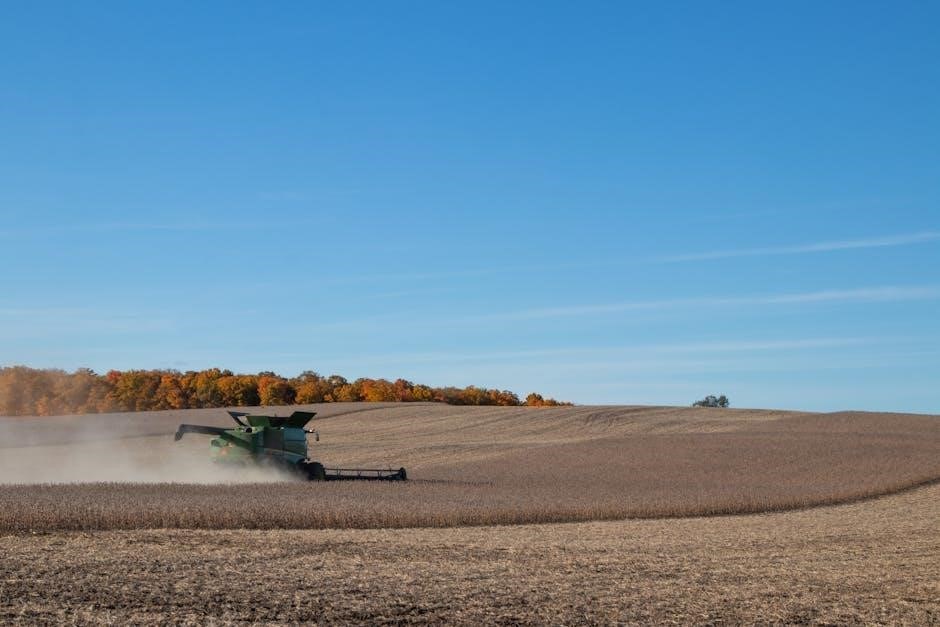
Used John Deere tractors in 2025 range from $4,157 for older models like the 1010 to over $200,000 for late-model, high-spec machines like the 9R Series․ Prices vary based on age, condition, and features, with mid-range models such as the 5050D typically selling between $30,000 and $70,000․ Buyers can find these tractors through dealerships, auctions, or private sales, with listings available on platforms like Machinery Pete for valuation guidance․
3․3 Regional Variations in Pricing
John Deere tractor prices vary significantly by region due to differences in demand, taxes, and market conditions․ In regions like NSW, Queensland, and SA, prices may be higher due to local demand and specifications․ Additionally, a 15% VAT in some areas can affect pricing․ Buyers should research regional market trends and consult local dealers to understand pricing variations and secure fair deals tailored to their location and requirements․

How to Determine the Value of a Specific Tractor
Evaluating a tractor’s value involves using tools like the OBV tool, checking recent sale prices, and assessing condition․ Factors such as model, year, and usage are key․
4․1 Using the OBV Tool for Valuation
The OBV (Official Book Value) tool provides accurate tractor valuations by analyzing make, model, year, and trim․ It offers fair market pricing reports in seconds, essential for buyers and sellers․ This tool helps determine a tractor’s worth based on current market data, ensuring informed decisions․ Regular updates keep valuations precise, making it a reliable resource for assessing tractor value effectively․
4;2 Checking Recent Sale Prices
Checking recent sale prices is crucial for determining a tractor’s value․ Platforms like Machinery Pete list thousands of sold tractors, providing insights into market trends․ By analyzing these sales, buyers and sellers can gauge fair pricing․ However, sale prices may not always reflect true value, as they can vary based on condition, location, and other factors․ This data helps set realistic expectations for negotiations and purchasing decisions․
4․3 Evaluating Tractor Condition
Evaluating the condition of a tractor is vital for accurate valuation․ Factors like operational hours, maintenance records, and wear on parts such as tires and hydraulics play a significant role․ A well-maintained tractor with low hours and proper servicing typically retains higher value․ Inspecting for any damage or needed repairs helps determine its current state and potential resale value, ensuring a fair assessment for buyers and sellers alike․
Build and Price Your John Deere Tractor
Customize your tractor with various attachments, features, and accessories to meet specific needs․ Use the Build & Price tool to explore configurations and determine costs effectively․
5․1 Customization Options and Attachments
John Deere tractors offer extensive customization options, including hydraulic systems, PTO configurations, and specialized attachments like loaders and mowers․ These additions enhance functionality, catering to diverse agricultural and landscaping needs․ With dozens of attachments available, users can tailor their tractors to specific tasks, improving efficiency and versatility․ Customizing ensures the tractor meets individual preferences, boosting both productivity and resale value over time․
5․2 Impact of Accessories on Value
Accessories and attachments significantly influence a John Deere tractor’s value․ High-demand features like GPS systems, auto-steer technology, and premium cab interiors can increase resale value․ Additionally, functional attachments such as loaders and plows boost versatility, making the tractor more appealing to potential buyers․ Well-chosen accessories enhance productivity and longevity, ensuring higher returns when selling or trading in the tractor․ Strategic customization is key to maximizing investment value․
5․3 Using the Build & Price Tool
John Deere’s Build & Price Tool allows users to customize tractors with options, attachments, and accessories․ It provides a detailed pricing breakdown, helping buyers understand how each addition impacts the total cost․ This interactive feature enables visualization of the tractor’s final configuration, ensuring it meets specific needs․ By exploring different combinations, users can make informed decisions to maximize their investment while aligning the tractor’s capabilities with their operational requirements and budget constraints effectively․

Used John Deere Tractor Market Insights
The used John Deere tractor market offers diverse options, with popular models like the D Series and Certified Pre-Owned programs ensuring reliability․ Buyers can explore platforms like Machinery Pete for competitive pricing and wide availability, making it easier to find a tractor that fits their needs and budget effectively․
6․1 Popular Models in the Used Market
Popular used John Deere models include the D Series, known for durability, and the 5E Series, favored for versatility․ The 6M Series is sought after for its advanced features, while compact models like the 3E Series remain in high demand for smaller operations․ These models retain strong resale value due to their reliability and widespread use across various agricultural applications and conditions․
6․2 Certified Pre-Owned Programs
Certified Pre-Owned (CPO) programs offer buyers added confidence by ensuring used tractors meet rigorous standards․ These programs typically include multi-point inspections, extended warranties, and detailed maintenance records․ CPO tractors often retain higher value and provide peace of mind, making them a popular choice for those seeking reliable, high-quality used equipment without the premium cost of new models․ This ensures a smoother ownership experience and better resale potential․
6․3 Where to Buy Used Tractors
Used John Deere tractors can be purchased through various channels, including authorized dealerships, online marketplaces like Machinery Pete, and private sales․ Dealerships often offer certified pre-owned options, while online platforms provide a wide selection and competitive pricing․ Additionally, regional auctions and local classifieds are viable options for finding used tractors, ensuring buyers can locate the best fit for their needs and budget․
Antique and Vintage John Deere Tractors
Antique and vintage John Deere tractors hold significant historical value, with prices increasing due to proper restoration․ These heritage machines attract collectors and enthusiasts worldwide․
7․1 Value of Heritage Tractors
Heritage tractors, such as vintage John Deere models, hold significant value due to their historical significance and rarity․ Proper restoration can substantially increase their worth, appealing to collectors․ The condition, originality, and rarity of these tractors play a crucial role in determining their market value․ For instance, well-maintained models like the John Deere 1010 can command higher prices, making them desirable for enthusiasts and investors alike․

7․2 Antique Tractor Pricing Trends
Antique John Deere tractors have shown steady appreciation, with rare models commanding premium prices․ Factors like condition, originality, and historical significance influence their value․ Recent sales indicate that restored models, such as the 1010, can fetch up to 50% more than unrestored counterparts․ Auction trends reveal increasing demand, making antique tractors a valuable collector’s item․ This upward trend highlights their appeal as both functional machines and historical artifacts․
7․3 Restoration and Collectibility
Vintage John Deere tractors are highly sought after by collectors, with restoration significantly boosting their value․ Rare and well-maintained models, such as the 1010, are particularly desirable․ Collectors often prioritize originality and historical significance, while restored tractors with authentic parts command premium prices․ The process of restoration not only preserves heritage but also enhances the tractor’s appeal, making it a valuable asset for enthusiasts and investors alike․

Maintenance and Its Impact on Tractor Value
Regular maintenance is crucial for preserving tractor value․ Proper servicing, timely repairs, and detailed record-keeping can significantly prevent depreciation and enhance resale potential over time․
8․1 Importance of Regular Servicing
Regular servicing is vital for maintaining tractor value․ It ensures optimal performance, prevents costly repairs, and extends equipment lifespan․ By adhering to John Deere’s recommended service intervals, owners can safeguard their investment, reduce downtime, and retain higher resale value․ Proper maintenance records also signal careful ownership, making the tractor more attractive to potential buyers․ Consistency in upkeep is key to preserving long-term functionality and value․
8․2 Repair Costs and Value Retention
Addressing repairs promptly is crucial for value retention․ Neglecting issues can lead to higher costs and reduced tractor worth․ John Deere tractors with a history of timely repairs command better prices․ Owners should prioritize fixing mechanical issues to maintain functionality and aesthetics, ensuring the tractor remains competitive in the market; Proactive maintenance not only prevents deterioration but also signals responsible ownership, which is attractive to buyers and supports higher resale value․
8․3 Record-Keeping for Higher Resale Value
Detailed documentation enhances resale value by providing transparency․ Maintain records of maintenance, repairs, and usage to demonstrate responsible ownership․ Service histories, repair invoices, and usage logs showcase a tractor’s condition․ This documentation reassures buyers, reducing perceived risks․ Well-organized records can justify higher pricing and attract serious buyers, ultimately maximizing the tractor’s resale potential․ Proper documentation is a critical factor in retaining and showcasing value effectively․
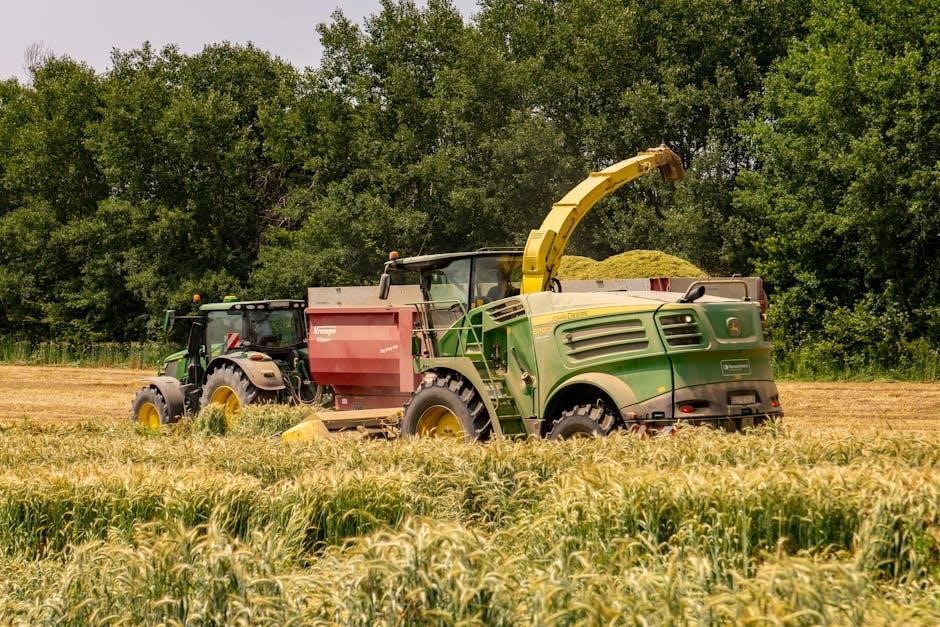
Financing Options for John Deere Tractors
Explore various financing plans, including competitive interest rates and extended warranty options․ Lease vs․ purchase decisions can be tailored to suit your budget and operational needs effectively․
9․1 Financing Plans and Interest Rates
John Deere offers flexible financing plans with competitive interest rates to suit various budgets․ Buyers can explore tailored payment options, including promotional offers and extended terms․ Dealers often provide attractive financing packages, making it easier to acquire new or used tractors․ With varying down payment options and term lengths, these plans aim to balance affordability and accessibility for both individuals and businesses․
9․2 Extended Warranty and Insurance
John Deere offers extended warranty programs and insurance options to protect your investment․ These plans provide coverage for repairs and replacements, reducing unexpected maintenance costs․ Insurance options safeguard against accidents or damage, ensuring long-term value retention․ Extended warranties and insurance are often integrated into financing packages, offering peace of mind and financial security for tractor owners․
9․3 Lease vs․ Purchase Options
John Deere tractor financing offers lease and purchase options to suit different needs․ Leasing provides lower upfront costs and flexibility, ideal for short-term use or testing equipment․ Purchasing offers long-term ownership and potential value retention․ Both options can be tailored with financing plans, allowing buyers to balance budget and operational requirements effectively․ Leasing may include return options, while purchasing builds equity over time, supporting future upgrades or sales․
Comparing John Deere to Other Brands
John Deere tractors are often compared to brands like Case IH and Kubota, with differences in pricing, features, and value retention․ John Deere is known for premium technology and durability, while other brands may offer more affordable options․ This comparison helps buyers evaluate which brand aligns best with their needs and budget․
10․1 Value Comparison with Case IH and Kubota
John Deere tractors often command higher prices than Case IH and Kubota due to advanced technology and durability․ However, Case IH offers competitive pricing with similar features, while Kubota excels in compact utility tractors․ Resale values vary, with John Deere typically retaining value better․ Buyers should consider their specific needs, as Kubota may offer better affordability for smaller operations, and Case IH provides a balance of cost and capability․
10․2 Features and Pricing Differences
John Deere tractors are generally priced higher than Case IH and Kubota, reflecting their advanced technology and durability․ Case IH tractors often offer similar features at a lower cost, appealing to budget-conscious buyers․ Kubota specializes in compact utility tractors, providing excellent value for smaller-scale operations․ Buyers should compare horsepower, hydraulic capacity, and additional features like GPS and automation to determine the best fit for their needs and budget․
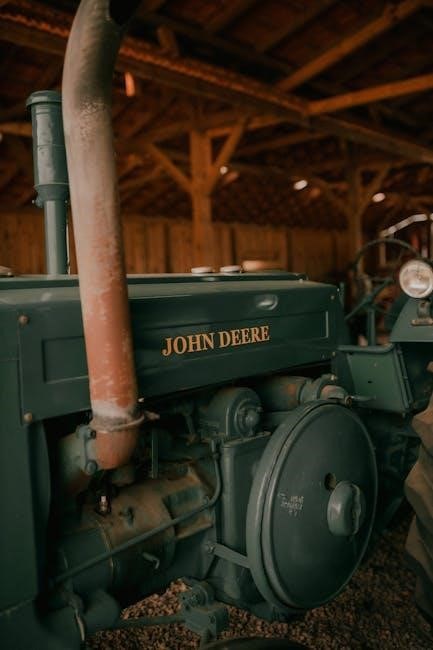
10․3 Brand Loyalty and Resale Value
John Deere tractors retain a strong resale value due to their reputation for durability and advanced technology․ Brand loyalty among farmers and agricultural professionals contributes to consistent demand, making John Deere tractors a reliable investment․ In comparison, Case IH and Kubota also hold value, but John Deere’s premium branding and extensive service network often result in higher resale prices, appealing to those prioritizing long-term value retention․

Recent Trends in Tractor Value
John Deere’s shift toward electric tractors and advanced sustainability features is reshaping tractor value․ These innovations are driving demand and increasing resale worth, aligning with eco-friendly trends․
11․1 Impact of New Technology
John Deere’s integration of new technology, such as autonomous systems and precision agriculture, significantly enhances tractor value․ These innovations improve efficiency and productivity, making high-tech models more desirable․ Advanced features like GPS-guided operations and real-time data analytics boost performance, attracting tech-savvy farmers․ Consequently, tractors equipped with cutting-edge technology retain higher resale value and command premium prices in the market․
11․2 Electric Tractors and Market Shifts
John Deere’s introduction of fully electric tractors marks a significant shift in the market, appealing to environmentally conscious buyers․ These eco-friendly models offer lower emissions and reduced operating costs, aligning with sustainability trends․ The demand for electric tractors is growing, influencing pricing dynamics and resale value․ This innovation positions John Deere as a leader in the transition to greener agriculture, attracting a new wave of environmentally focused customers․
11․3 Sustainability and Value
Sustainability is increasingly influencing tractor value, with eco-friendly features attracting premium prices․ John Deere’s electric and hybrid models, emphasizing reduced emissions and energy efficiency, are commanding higher resale values․ Buyers prioritize environmentally responsible machinery, boosting demand for sustainable tractors․ This trend not only enhances value but also aligns with global environmental goals, making sustainable tractors a smart long-term investment for farmers and agricultural businesses․
This guide provides a comprehensive overview of John Deere tractor valuation, helping buyers and sellers make informed decisions․ Stay updated on market trends to ensure success in transactions․
12․1 Key Takeaways for Buyers and Sellers
Understanding tractor valuation is crucial for both buyers and sellers․ Key factors like horsepower, model year, and usage hours significantly impact value․ Advanced technology and features also play a role in maintaining or increasing a tractor’s worth․ Buyers should research market trends and use tools like the OBV tool for accurate valuations․ Sellers can enhance resale value by maintaining proper servicing records and ensuring the tractor is in good condition․ Regular maintenance and customization options can also boost value, making the tractor more attractive to potential buyers․ Additionally, considering regional pricing variations and exploring financing options can aid in making informed decisions․ Overall, staying informed about market trends and leveraging available resources ensures successful transactions for both parties․
12․2 Future Predictions for John Deere Tractor Values
John Deere tractor values are expected to rise due to increasing demand for advanced technology and sustainable solutions․ The introduction of electric tractors and eco-friendly equipment will likely boost market value․ Additionally, integration of autonomous features and smart farming tools may enhance tractor valuations․ As sustainability becomes a priority, eco-conscious models could command higher prices, making John Deere a leader in the evolving agricultural machinery market․
